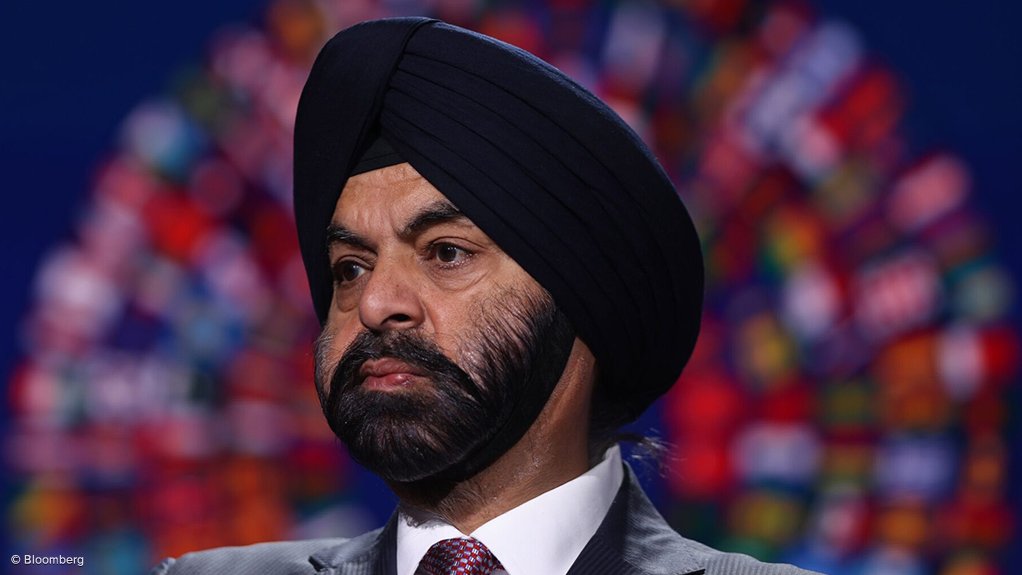World Bank's Banga doubles down on intent to end a ban on loans for nuclear power projects
World Bank president Ajay Banga on Wednesday doubled down on his push to revamp the bank's energy strategy to end a ban on lending for nuclear power projects and enable more natural gas projects, saying he will seek executive board approval in June.
The changes would mark a shift from the bank's focus only on renewable energy projects, save for consideration for some gas projects in the poorest countries.
"We have a meeting with our board in June, and I want to discuss how to talk about the 'all of the above' strategy on energy, which is not renewable energy, but a transition plan for everyone," Banga told reporters.
The strategy would include natural gas, geothermal, hydroelectric, solar, wind and nuclear power, "where it makes sense," he said, but a change in the bank's current approach requires board approval and shareholder approval.
Banga, who has championed a shift in the bank's energy policy since taking office in June 2023, has discussed the changes with US Treasury Secretary Scott Bessent, who oversees the US shareholding in the bank, two sources said.
The US is the bank's single largest shareholder -- at 15.83%, followed by Japan with 7% and China with close to 6% -- and the change will likely please President Donald Trump, who withdrew the US from the Paris Climate Agreement and its emission-reduction targets as one of his first acts in office in January.
Washington is pushing the bank to become more "energy agnostic" and drop its ban on nuclear power investments as it reviews the United States' continued role in the multilateral development bank, a White House official said recently.
The US has withdrawn from other multilateral institutions such as the World Health Organization, fanning concerns that it could also pull out of the World Bank.
Asked about the issue, Banga said the bank was holding constructive talks with the United States.
Senior World Bank sources said the bank's new energy strategy is expected to continue to exclude oil and coal.
The global development bank, which lends at low rates to help countries build everything from railroads to flood barriers, announced in 2017 that it would stop funding upstream oil and gas projects beginning in 2019, but said it would still consider gas projects in the poorest countries. It had announced in 2013 that it would no longer fund nuclear power projects.
The new energy paper will not be finished in time for the Spring Meetings of the World Bank and International Monetary Fund in Washington next month.
Trump officials and some development experts say developing countries should not be blocked from using inexpensive power to expand their economies while advanced economies like Germany continue to burn fossil fuels.
"The bank is a development bank. It is not the 'Bank of Climate Change,'" the White House official said, noting that surveys of World Bank client countries showed they ranked climate change as 19th on a list of 20 top priorities.
"If you're trying to make sure that your people are fed and not dropping dead from disease, that's your priority, and that's what the World Bank is supposed to be focused on," the official said.
Allowing the financing of nuclear power projects was also a geopolitical imperative, the official said, noting that China was catching up quickly to Western capabilities and was permitting new plants much faster than the United States.
Climate activists worry that opening the door to nuclear and natural gas will divert funds away from urgently needed efforts by developing countries to adapt to climate change and to benefit from abundant alternative energy sources such as solar.
The World Bank is sticking to its target of spending 45% of its lending on climate change, Banga said, underscoring that many projects would boost growth and jobs even as they helped countries adapt to climate change.
The bank's executive board and shareholders, including long-time nuclear critic Germany, have grown more supportive of funding natural gas projects, especially in Africa, one source familiar with the board's thinking said.
Gyude Moore, a non-resident fellow at the Center for Global Development, said the bank's current policy effectively punished the people least responsible for the climate crisis.
"It created a perverse scenario where African oil and gas were extracted and used elsewhere, but not developed for use on the continent itself," he said.
Article Enquiry
Email Article
Save Article
Feedback
To advertise email advertising@creamermedia.co.za or click here
Announcements
What's On
Subscribe to improve your user experience...
Option 1 (equivalent of R125 a month):
Receive a weekly copy of Creamer Media's Engineering News & Mining Weekly magazine
(print copy for those in South Africa and e-magazine for those outside of South Africa)
Receive daily email newsletters
Access to full search results
Access archive of magazine back copies
Access to Projects in Progress
Access to ONE Research Report of your choice in PDF format
Option 2 (equivalent of R375 a month):
All benefits from Option 1
PLUS
Access to Creamer Media's Research Channel Africa for ALL Research Reports, in PDF format, on various industrial and mining sectors
including Electricity; Water; Energy Transition; Hydrogen; Roads, Rail and Ports; Coal; Gold; Platinum; Battery Metals; etc.
Already a subscriber?
Forgotten your password?
Receive weekly copy of Creamer Media's Engineering News & Mining Weekly magazine (print copy for those in South Africa and e-magazine for those outside of South Africa)
➕
Recieve daily email newsletters
➕
Access to full search results
➕
Access archive of magazine back copies
➕
Access to Projects in Progress
➕
Access to ONE Research Report of your choice in PDF format
RESEARCH CHANNEL AFRICA
R4500 (equivalent of R375 a month)
SUBSCRIBEAll benefits from Option 1
➕
Access to Creamer Media's Research Channel Africa for ALL Research Reports on various industrial and mining sectors, in PDF format, including on:
Electricity
➕
Water
➕
Energy Transition
➕
Hydrogen
➕
Roads, Rail and Ports
➕
Coal
➕
Gold
➕
Platinum
➕
Battery Metals
➕
etc.
Receive all benefits from Option 1 or Option 2 delivered to numerous people at your company
➕
Multiple User names and Passwords for simultaneous log-ins
➕
Intranet integration access to all in your organisation




















